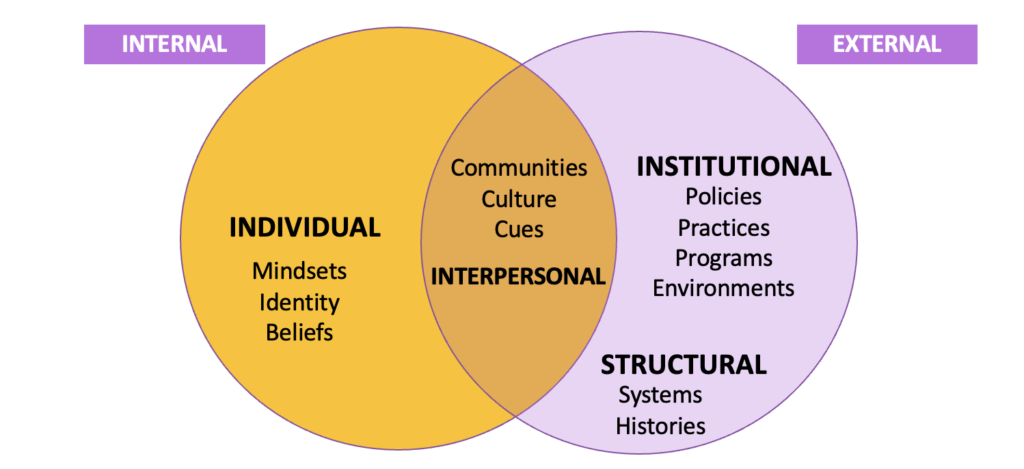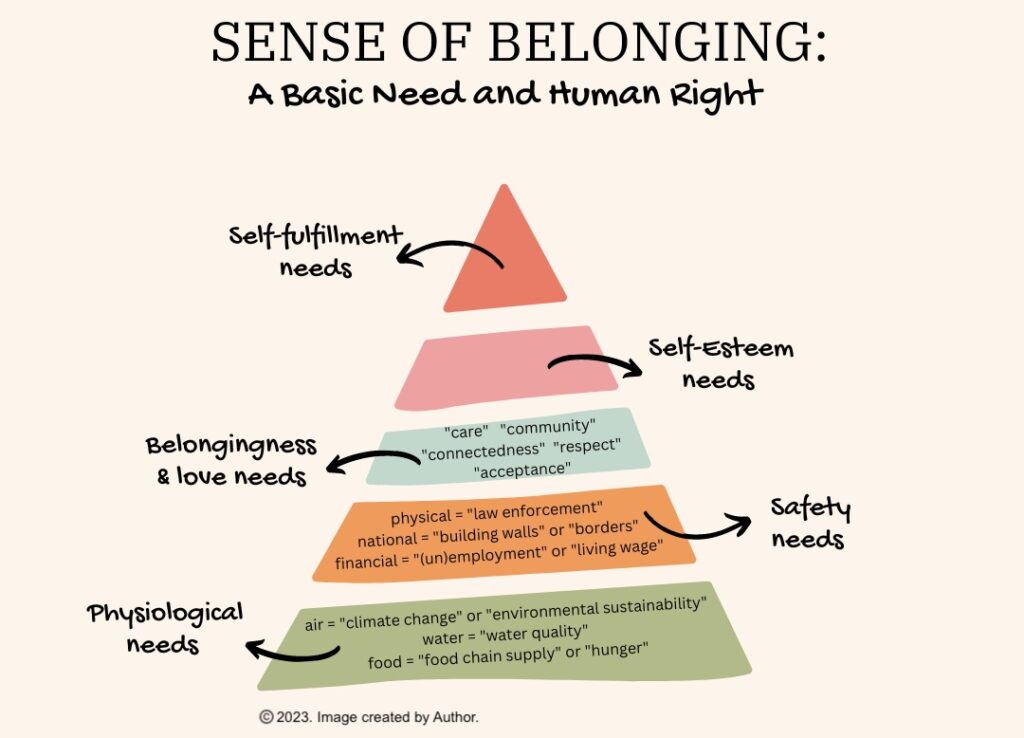The desire to belong is a fundamental part of human nature. Its absence can have serious consequences. Its presence can produce positive gains. Threats to belonging drive major problems, ranging from educational achievement gaps, deep disengagement, mental illness, and political polarization.
According to experts, people yearn to commune, collaborate, and connect with others at a deep level. Whether it’s family, friends, classmates, co-workers, or a religion, connecting with others and to something larger than oneself facilitates belongingness. Rather than changing or concealing aspects of oneself to fit it, true belonging is about being accepted, respected, and included just as you are, flaws and all. It’s also about feeling brave and unafraid to stand out, stand alone, or stand up for what you believe in.
Basic Need and Human Right
Sense of belonging is a basic need and human right. Feeling that one belongs — or doesn’t belong — can impact people in ways that are vital to their health, well-being, and academic, social, or professional success. Lacking a true sense of belonging carries many negative consequences, such as low self-esteem, impaired judgment, self-doubt, and higher risk for criminality, depression, and other mental and physical health problems.
Researchers across disciplines have stressed the importance of a sense of belonging. For example, industrial-organization scholars have identified different conditions that can increase a person’s sense of belonging. Diversity scholars have focused on how similarities and differences shape the bonding component of belonging. Psychological studies have found that the appraisal of social worthiness is a significant predictor of belonging. Further, education researchers have used longitudinal and person-centered approaches to measure how sense of belonging at school emerges over time with consideration of personal, social and environmental moderators.
Several other studies have shown that people who have a strong sense of belonging at work (i.e., workplace belonging) perform better, make better products, and are more likely to stay at their jobs. This makes good sense (pun intended)–sense of belonging boosts employee engagement, cooperation, and innovation, all of which are important for organizational health and success. People who feel a strong sense of belonging at work are able to share their ideas, speak up, and be themselves at work, without fear of retribution, retaliation, or unjustifiable termination. Figure 1 presents a graphical summary of these points.

Reflected in Political Conversations
Belonging is a basic need and a human right, not a political issue. Everyone yearns to belong. Old and young. Tall and short. Rich and poor. Straight and gay (or otherwise identified). And, yes, conservative, liberal, or independent. Though perhaps less obvious than government spending and costly financial bail-outs, sense of belonging is a big ticket issue in politics and recent political conversations. In fact, it can be argued that the importance of providing voters with opportunities to feel connected, respected, safe, secure, and accepted has never been more evident.
Consider, for instance, the first GOP debate of the 2024 presidential election that was held at the Fiserv Forum in Milwaukee, Wisconsin. Candidates were asked questions by Fox News moderators Martha MacCallum and Bret Baier, ranging from tax costs to grocery costs, nuclear threats, and global conflicts, just to name a few. Despite Trump’s decision to skip the debate, other Republican presidential hopefuls engaged in spirited debate about conservative values, the future of the party, abortion, and the current administration’s response to terrorism, wildfires, and unemployment.
Notably, sense of belonging lies at the center of many political conversations. For example, virtually all candidates at the first GOP debate proved the importance of belonging by raising concerns about basic needs, safety and security, community, and connectedness. Admittedly, their uses ranged from tactics promoting unity to those creating division. Florida Governor Ron DeSantis, for instance, pulled on our innate need for belonging and protection to garner support for his promise to “secure our…borders.” Other key aspects of belonging are reflected in candidates comments about walls, local/global community, and illegal immigration, with the latter implying that some people belong here (others do not). Again, belonging is about feeling connected to something larger than oneself and several candidates invoked this language as they laid out their vision for America, promising “a [future] America that is proud and strong” (former South Carolina Governor Nikki Haley) or a “revived national identity” (Vivek Ramaswamy), to which voters can feel a sense of belonging. Figure 2 presents other examples.

Indeed, sense of belonging is a basic need, but it’s also a key motivator in politics and elections. It is clear that candidates are trying to both elicit and promise a sense of belonging from/to voters. Regardless of readers’ political opinions, keep this in mind: sense of belonging is a feeling and it can’t be forced. It can be provoked, but probably not promised. It takes time and resources. It doesn’t happen automatically. It must be facilitated and nurtured. It requires safety, security, and trust–so like other things, belonging’s built at the speed of trust.
Conclusion
In conclusion, the role of ‘sense of belonging’ in political conversations cannot be underestimated. Sense of belonging is a complex and dynamic phenomenon that emerges in different ways. Rather than relying on participation or proximity to others, it’s a perception of quality, mattering, and meaning that influences how people view their relationships with one another and their worlds.
Political ideas and behavior can be significantly influenced when people have a strong sense of belonging to a specific group or ideology. Their desire to have meaningful conversations and reach agreements with others is also influenced by their sense of belonging, which may alter their viewpoints and judgments. Political discourse that is more inclusive and productive–where different points of view are recognized and valued–is sorely needed and can be fostered by recognizing and affirming the importance of belonging for all. We work towards more peaceful and productive political conversations when we acknowledge our differences, honor diverse perspectives, admit lived realities, and promise to live, love, and lead across such divisions to “establish justice, insure domestic tranquility…and secure the Blessings of Liberty,” one of which is a true sense of belonging.


